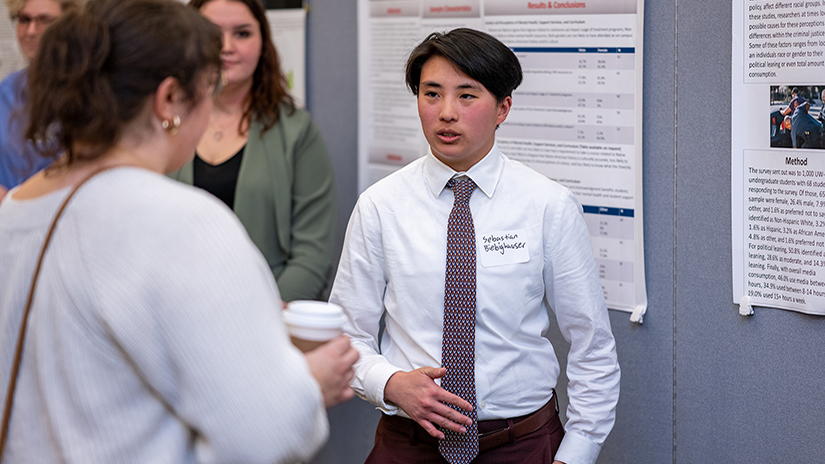UNIVERSITY OF WISCONSIN River Falls
Newsroom

UW-River Falls student Sebastian Biebighauser speaks about his research studying people’s perceptions of the criminal justice system related to a variety of factors during Wednesday’s Undergraduate Research, Scholarly and Creative Activity (URSCA) Fall Gala. UWRF Photo.
URSCA event showcases students’ research skills
Projects help develop students’ critical thinking, work ethic, partnerships
Dec. 6, 2023 - As he studied the potential impact of a mushroom from Thailand on treating cancer patients with fewer side effects than traditional medications, University of Wisconsin-River Falls student Ali Khan learned one of the lessons of research: predicted outcomes often aren’t predictable at all.
Khan, a senior from Woodbury, Minn., majoring in biomedical and health science, researched whether lingzhi, a mushroom used as a traditional medicine in southeast Asia, could effectively treat lung and breast cancer by slowing the growth of diseased cells. Khan was one of more than 100 UW-River Falls students whose research was on display at the university’s Undergraduate Research, Scholarly and Creative Activity (URSCA) Fall Gala Wednesday.
The research he conducted with his faculty mentor, Associate Biology Professor Cheng-Chen Huang, showed that treatments of mushroom extract did indeed reduce cancer cell growth. Excited, Khan next studied the impact of the medicine on noncancerous cells.
The result? Unfortunately, the traditional medicine also slowed the growth of healthy cells, meaning it would not be usable as a cancer treatment in its current form.
“That surprised me,” Khan said of the medicine’s impact on healthy cells. “It was a disappointing result. But it opens doors for future research.”
The annual URSCA Fall Gala highlights the research and scholarly activities of undergraduates, whose work included research posters, artwork, short films and interactive displays. Students described their research projects to people attending the event at the University Center.
Those discussions require a deep understanding of their work, URSCA Director Molly Gerrish said. The event celebrates students’ research, she said, and showcases their high-level thinking and research skills.
“This event is really about showing off what our students can do, their strong work ethic and their high level of knowledge,” Gerrish said. “It shows the high-quality research our students are doing.”
Like Khan, Sebastian Biebighauser was surprised by the outcome of his research project. Biebighauser, a senior from Victoria, Minn., majoring in criminology and sociology, studied people’s public perceptions of the criminal justice system related to a variety of factors.
Before beginning his research, he figured that race and media consumption would most directly shape people’s criminal justice views. He was surprised that his work showed that political leanings were instead the most important factor.
“I was pretty surprised to find that,” Biebighauser said. “That is why research is so important. It shows us that our preconceived ideas aren’t always borne out in fact. And research is always changing what we know. It is always evolving.”
As students discussed their research with event attendees, the quality of their work and their diligence were evident. In many cases their projects took months to compile. Others have been ongoing for more than a year and will continue.
Ashley Gruman, a senior food science and technology major from Fredonia, researched whether taurine, an essential amino acid, and caffeine can be combined and included in a dairy beverage that would be a healthy alternative to common energy drinks. Research projects teach students to think critically and find solutions to obstacles, she said.
“Doing research teaches you perseverance,” Gruman said. “You can’t run into a problem and just stop your research. That isn’t an option. You have to find a way to solve the problem or find a way to work around it.”
Gruman and four of her classmates did just that on another research project she was involved in. Last fall they began work developing a dairy-based, high-protein food that provided a calming effect. They titled the yogurt-like product RootCurd, and the team won a national award for its invention last summer.
Their research, along with RootCurd samples, was on display at the URSCA event. Anna Euerle, a senior majoring in food science and technology from Litchfield, Minn., worked with Gruman and others to develop RootCurd. The process was especially challenging, she said, in part because it included so many variables.
“When I started that project, I was a very by-the-book person,” Euerle said. “You do everything in order, and it should just go a certain way. RootCurd has taught me that isn’t the case. You have to expect that things are going to go wrong, and you have to always be thinking so that you can find ways around the problems.”
That sentiment is music to the ears of Provost and Vice Chancellor for Academic Affairs David Travis. He recalled his time as an undergraduate and the importance of research that he said, “changed my life.” As he asked students about their URSCA research, Travis said he was thrilled to see them learning the same lessons he did long ago.
“They are learning about forming a hypothesis, about doing the work of original research, about drawing conclusions from that work, and how those conclusions can change and evolve,” Travis said. “Developing those high-level skills will set our students on a path to success.”










